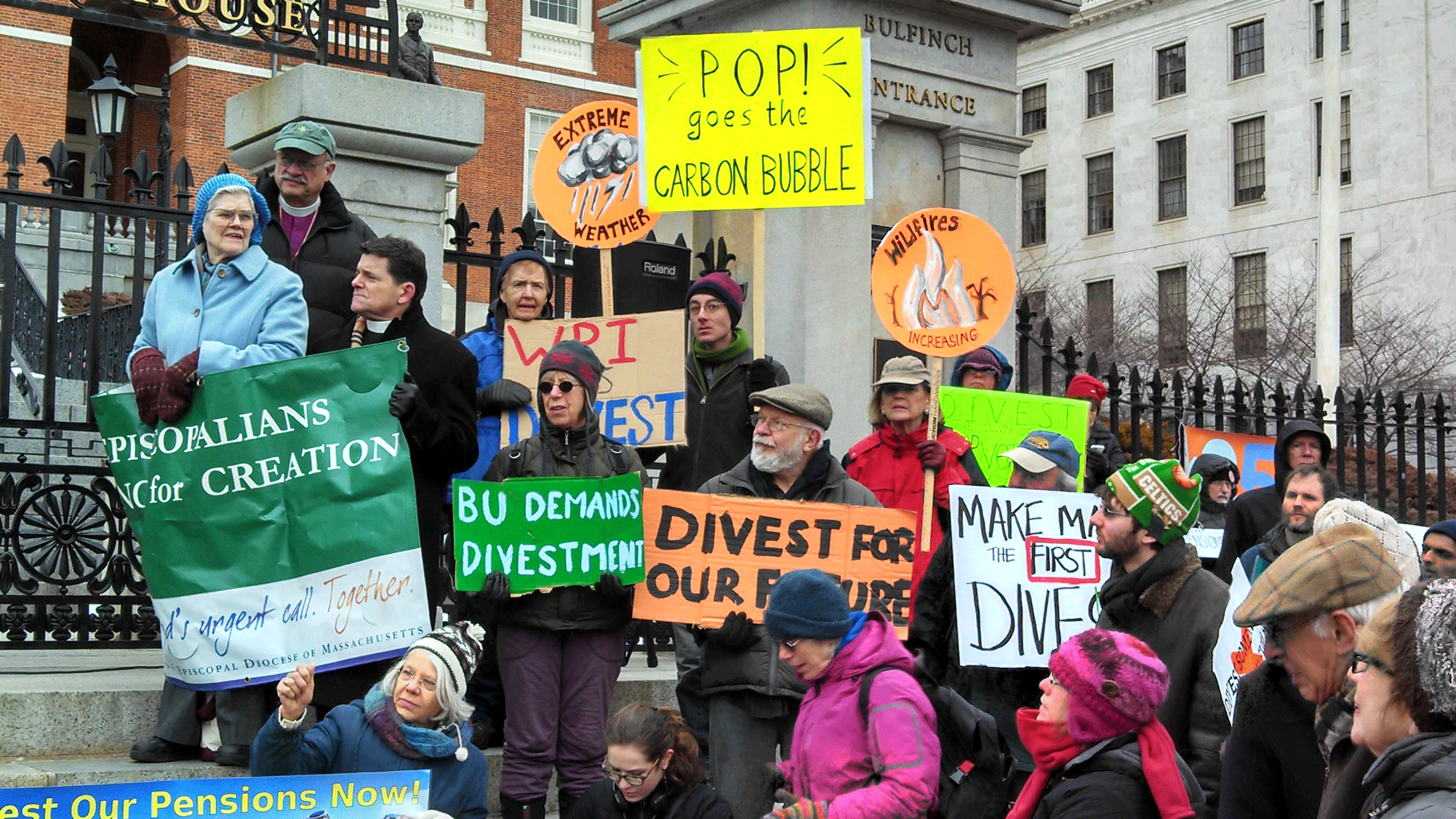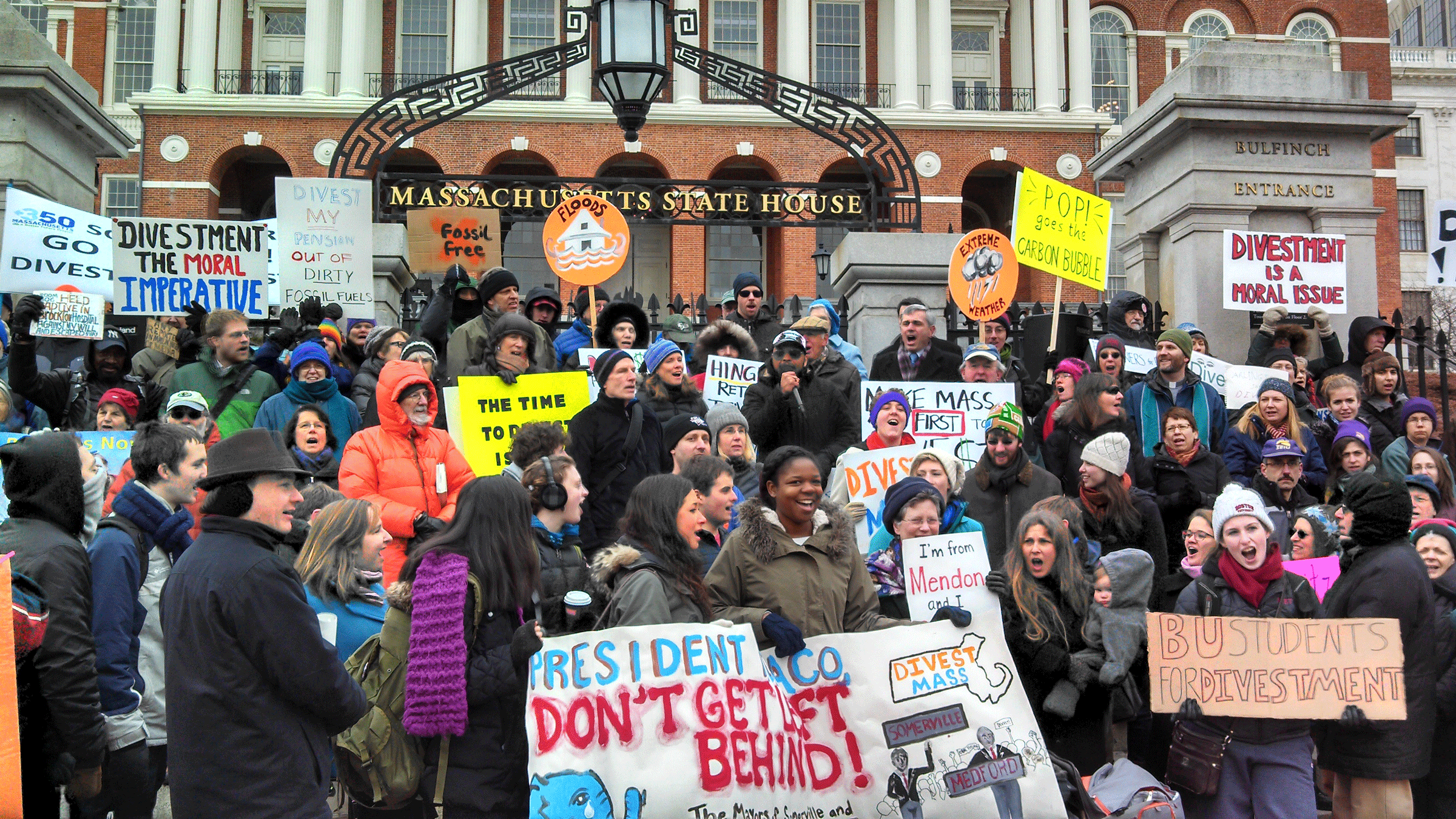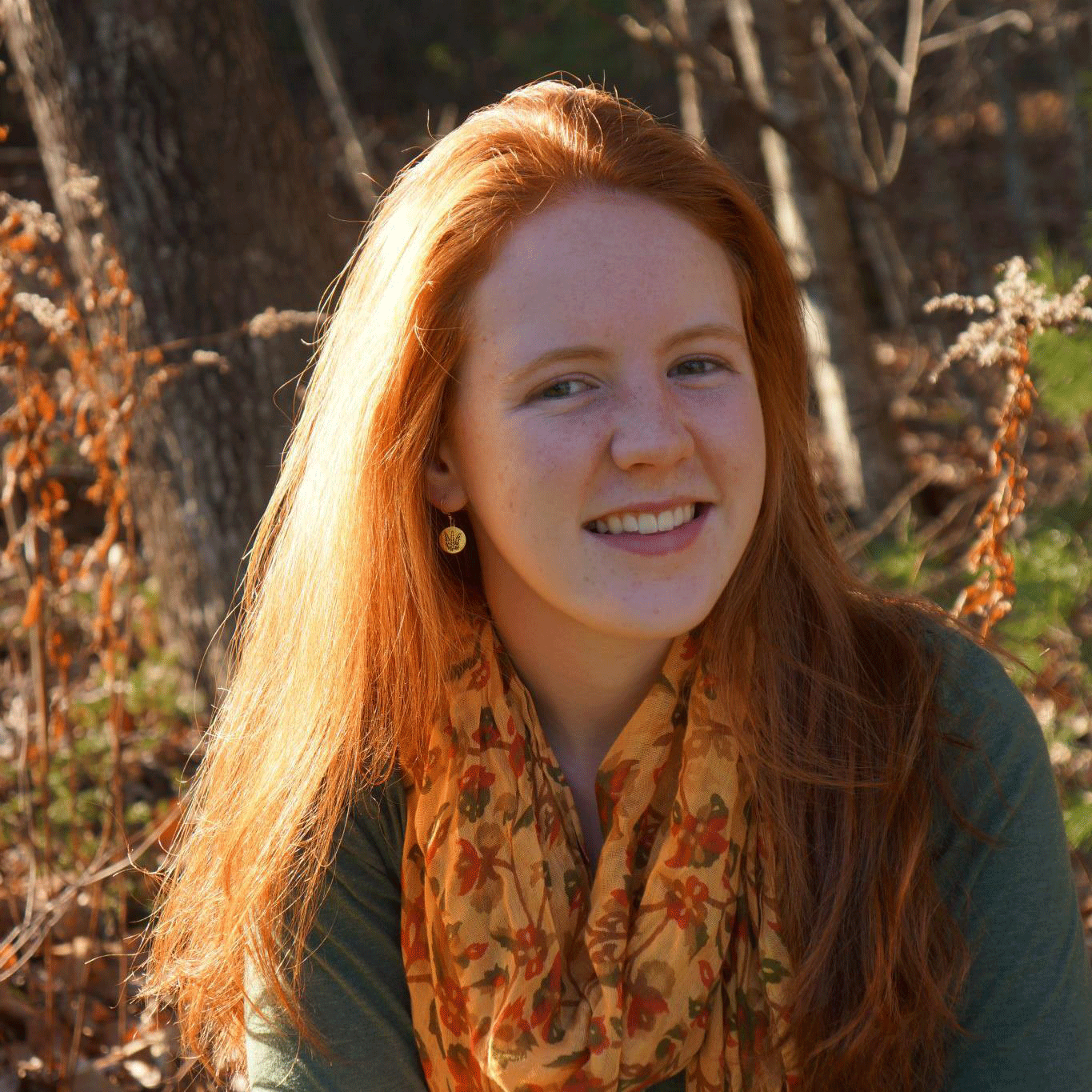Fossil Fuel Divestment Gains New Supporters
Air Date: Week of April 18, 2014

(Bobby Bascomb)
A growing movement across the country is demanding that institutions pull their investments out of fossil fuel companies. Living on Earth’s Bobby Bascomb reports that in Massachusetts, pensioners, professors, and students all urge divestment from the corporations most responsible for climate change.
Transcript
CURWOOD: It's Living on Earth, I'm Steve Curwood. The IPCC report says that to preserve a livable planet, we can't afford to burn all the fossil fuel reserves that companies have on their books. Investments in fossil fuels have been highly profitable, but company valuation is based on those reserves, and some warn that's increasingly risky. And a growing movement is calling for institutions and individuals to divest of those stocks for both moral and financial reasons. Divestment has been a powerful weapon before - it helped end apartheid in South Africa. In Massachusetts, the call for divestment is echoing both in the State House and at America’s richest university, Harvard. Living on Earth’s Bobby Bascomb has our story.
[CROWD CHANTS “DIVEST NOW! DIVEST NOW!”]
BASCOMB: Some 100 protestors are standing in front of the gold dome of the Massachusetts state house. They carry signs that read “climate justice now” and “break up with fossil fuels.” But these aren’t your usual climate activists. They are all retired state employees. Rachel Wyan used to teach school in Cambridge.
WYAN: We’re public employees and teachers and we’re working for the future. We’re working for our children and grandchildren and future generations. At least that’s what we would hope we want to have in the future, a livable planet for them. But we’re investing in the destruction of the air, the water, the earth.
BASCOMB: Roughly $1.3 billion of the Massachusetts’ state pension fund is directly invested in fossil fuel companies. More than a year ago, State Senator Ben Downing introduced Bill S 1225. It would require that state pension funds remove those investments within five years. The bill is currently waiting for a committee to make recommendations. That’s expected to take several more months but pensioner Richard Horsely, a retired University of Massachusetts professor, says there’s no time to wait to cut greenhouse gas emissions.

State employees rally outside the Massachusetts state house to demand the legislature divest their pensions from fossil fuel stocks. (Bobby Bascomb)
HORSELY: We’ve already passed the limit that we can afford with global warming. So we think it’s very important that in every possible way we move to stop fossil fuels. And Massachusetts must be the leader in this. It’s always been a leader. And it’s time for Massachusetts legislature to act now to divest our pension funds.
[CROWDING CHANTING: “WE ARE UNSTOPABLE, ANOTHER WORLD IS POSSIBLE”]
BASCOMB: Massachusetts is currently the only state with an active divestment bill working its way through the legislature. Vermont had a similar bill but it was rejected in March.
BASCOMB: At the end of the rally some of the pensioners marched into the state house here in Boston to lobby their representatives directly.
On the other side of the Charles River in Cambridge, Harvard University professors are taking a different approach to the same goal. More than 100 of them recently signed an open letter to Harvard President Drew Faust urging the university to divest its endowment from fossil fuel stocks. Joyce Chaplin teaches early American history; she’s one of the four professors who originally wrote the letter.
CHAPLIN: Continued consumption of fossil fuels will lead to higher and higher levels of carbon in the atmosphere and this will have disastrous consequences across the face of the planet. There will be warming and weirder weather. There will be acidification of the ocean. There will be loss of habitat for species that will go extinct. So we feel that continued interaction with these corporations is a bad idea, and we want the university to make a stand.

Harvard students rally for the university to divest from fossil fuels. (Divest Harvard)
BASCOMB: Harvard has the largest university endowment in the world, more than 30 billion dollars. No one here thinks divesting will cause the fossil fuel companies serious harm but it will send a strong message. Andrew Berry is a professor of evolutionary biology.
BERRY: Harvard has the opportunity to send a very clear signal, and it’s a signal which will be amplified and taken notice of because it’s Harvard University. So, for me it’s a no-brainer. What we’re doing is creating awareness that we as academics, as people who think hard about these things, people who understand the science, who understand the models, who understand the future scenarios, think that weaning ourselves off these fuels is a bloody good idea.
BASCOMB: But university administrators do not think it’s a good idea. Harvard president Drew Faust declined an interview, but she recently wrote an open e-mail to faculty and students. It read in part, “divestment from the fossil fuel industry would not be wise or effective as a means for the University to advance progress towards addressing climate change.”
Harvard does says it will become a signatory to the United Nations supported Principles for Responsible Investing - a voluntary guideline which some students see as inadequate. For the long term, President Faust argues that Harvard should work towards energy efficiency on campus and continue cutting-edge research on climate science and new technologies to mitigate climate change. Noticeably, President Faust never mentions lost revenue as a reason to retain fossil fuel stocks, but she does state that, “the endowment is a resource, not an instrument to impel social or political change.”
ONION: I disagree with that, obviously, because the fact that the endowment is currently invested in fossil fuels is a political statement in itself.

Zoe Onion is a freshman molecular biology major at Harvard. (Zoe Onion)
BASCOMB: 18-year-old Zoe Onion is a molecular biology major and one of the student organizers for divestment. Zoe says for her this is a moral issue.
ONION: Frankly, I’m terrified—because I’ve seen the numbers. I know what climate change is going to do to this world. I know that we are already on this path and there’s nothing we can do to get off it, but there are things we can do to make the damage less, and there things we can do to make our lives and the lives of our children better. I believe that it’s really important to do whatever we can and divestment is the most powerful thing we can do as students.
BASCOMB: Bill McKibben’s organization 350.org has taken the divestment campaign to more than 100 colleges across the country. And it’s gaining some traction - ten universities have already pledged to pull their endowment cash out of fossil fuels. But here in the Bay State, students, professors, and pensioners alike hope there’s still time for Harvard and Massachusetts as a whole, to take a leadership role when it comes to removing investments from fossil fuel corporations.
[CROWD CHANTING “DIVEST! DIVEST!”]
For Living on Earth, I’m Bobby Bascomb in Boston, Massachusetts.
Links
Drew Faust : Fossil Fuel Divestment Statement
Living on Earth wants to hear from you!
Living on Earth
62 Calef Highway, Suite 212
Lee, NH 03861
Telephone: 617-287-4121
E-mail: comments@loe.org
Newsletter [Click here]
Donate to Living on Earth!
Living on Earth is an independent media program and relies entirely on contributions from listeners and institutions supporting public service. Please donate now to preserve an independent environmental voice.
NewsletterLiving on Earth offers a weekly delivery of the show's rundown to your mailbox. Sign up for our newsletter today!
 Sailors For The Sea: Be the change you want to sea.
Sailors For The Sea: Be the change you want to sea.
 The Grantham Foundation for the Protection of the Environment: Committed to protecting and improving the health of the global environment.
The Grantham Foundation for the Protection of the Environment: Committed to protecting and improving the health of the global environment.
 Contribute to Living on Earth and receive, as our gift to you, an archival print of one of Mark Seth Lender's extraordinary wildlife photographs. Follow the link to see Mark's current collection of photographs.
Contribute to Living on Earth and receive, as our gift to you, an archival print of one of Mark Seth Lender's extraordinary wildlife photographs. Follow the link to see Mark's current collection of photographs.
 Buy a signed copy of Mark Seth Lender's book Smeagull the Seagull & support Living on Earth
Buy a signed copy of Mark Seth Lender's book Smeagull the Seagull & support Living on Earth

